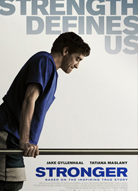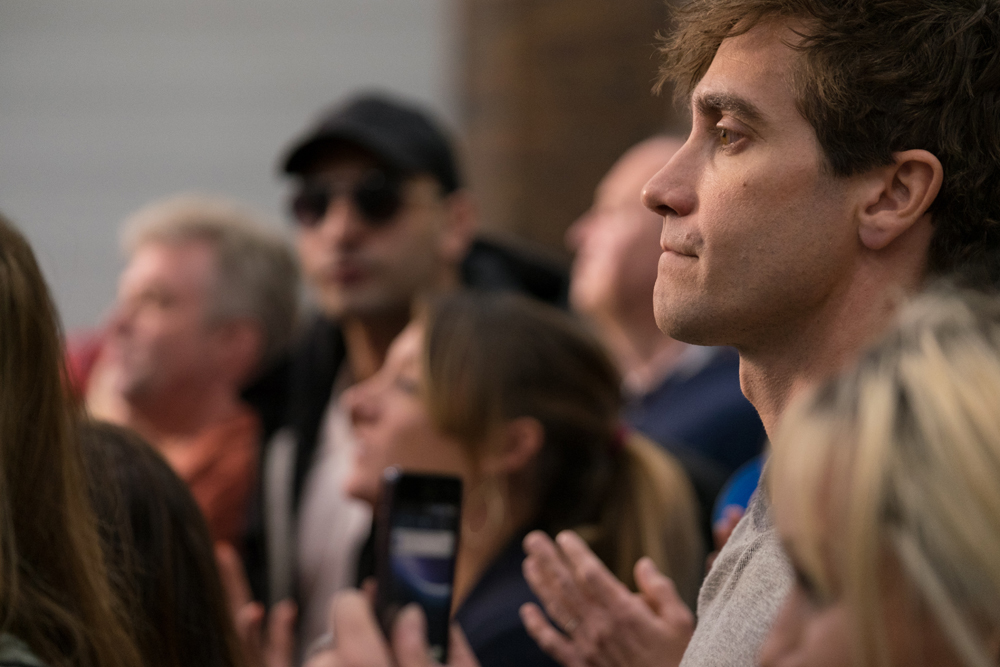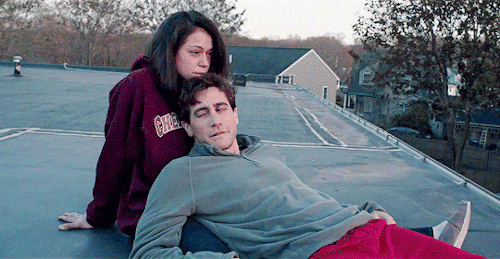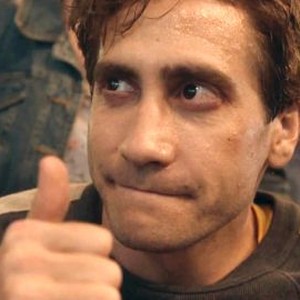by Eric Blume

Have patience watching director David Gordon Green’s film Stronger, which captures real-life Boston native Jeff Bauman (played by Jake Gyllenhaal) as he’s caught in the 2013 Marathon bombing. After a rickety start, Green relaxes into a nice rhythm and delivers an almost extinct creature: a true adult movie drama.
The first few scenes of Stronger come on a little, ahem, strong. They’re written to show what a great guy Bauman is (he cuts out from work so he and his lucky beer can help the Red Sox win, he stands up for his gay boss), and Green has all the actors pushing too hard. The initial scene where we meet Bauman’s family (including mom Miranda Richardson and girlfriend Tatiana Maslany) in a bar reeks of Boston cliché. It’s a very tricky thing, honestly capturing that lower-middle-class Beantown language and attitude, and Green overplays his hand in this and several other early scenes. The energy is overly commercial, and the movie gets off to an uneasy start.

But once the big sequence begins, where Bauman loses his legs in the terrible terrorist attack, Green begins observing smaller details, and starts scoring...
The segment where the doctors take off Bauman’s bandages is shot in one long take from above, as we are truly fused with Bauman’s experience: it’s a sequence that would have been left out, or edited down, in another movie like this. But part of the strength of the film is that we're forced to watch all the real, small increments of recovery. Green also does a beautiful job of helping us understand how people talk above and around Bauman at all times, how they grope at him and he’s on display. He also orchestrates scenes where characters explode against each other without easy explanation, and the arguments feel true to the way they play out in real life.

There’s a scene where Gyllenhaal rests between the legs of Maslany, leaning against her, that feels incredibly intimate and vulnerable, but then every scene involving these two actors together is magic. Maslany gives a seemingly effortless naturalistic performance; she’s never “acting” and she finds her own arc within the limited confines of her character. While it’s largely the supportive girlfriend role, she’s allowed an inner life and is no victim. Maslany enters every scene fresh and in the moment and she brings out a bruising tenderness in her leading man.
Gyllenhaal remains one of our finest, still-undersung actors, and his work here is exemplary. Not much happens in Stronger, so the film really needs his star magnetism, which he’s able to combine with regular-man simplicity. Gyllenhaal’s ability to be completely special but completely ordinary isn’t something that just happens -- he has the intelligence and instinct to know what’s required at any given moment. It’d be wonderful to see his measured, thoughtful, complex work recognized at the Oscars this year.
 Stronger falls very short of being a great movie. Bauman’s relationship with his mother is probably the key one, but it’s not shaped: you keep waiting for Richardson to figure, or for the film to take them deeper, and it never happens. You’re never really clear exactly what their relationship is made of. And there are no new ideas in the film, or even new insights into ideas we’ve seen in other movies of this type. But at the end of the film, you’re struck with how smartly it all unfolds, and how gracefully the artists have trusted in the material. We don’t get many films these days with regular adults dealing with regular problems, full of actors who have (mostly) good dialogue and something human and direct to play. Green’s Stronger needs everyone’s support so we can get more good things down the line.
Stronger falls very short of being a great movie. Bauman’s relationship with his mother is probably the key one, but it’s not shaped: you keep waiting for Richardson to figure, or for the film to take them deeper, and it never happens. You’re never really clear exactly what their relationship is made of. And there are no new ideas in the film, or even new insights into ideas we’ve seen in other movies of this type. But at the end of the film, you’re struck with how smartly it all unfolds, and how gracefully the artists have trusted in the material. We don’t get many films these days with regular adults dealing with regular problems, full of actors who have (mostly) good dialogue and something human and direct to play. Green’s Stronger needs everyone’s support so we can get more good things down the line.